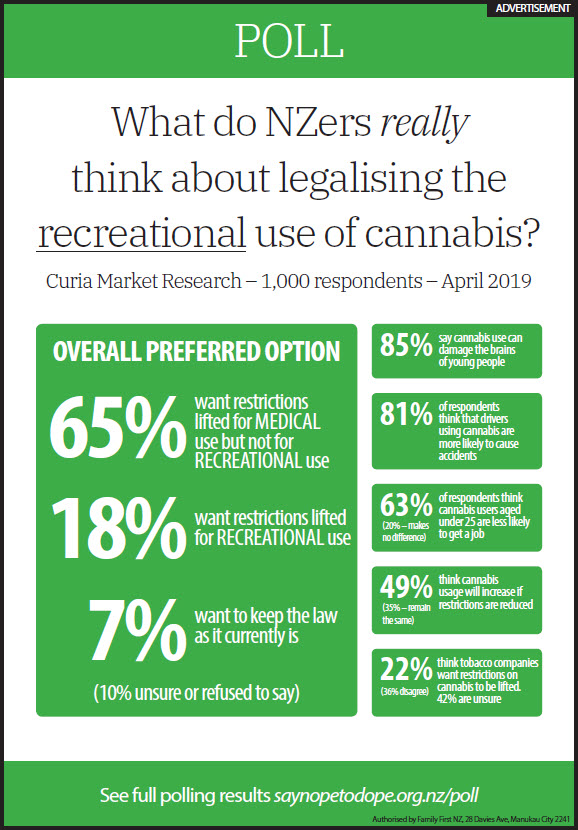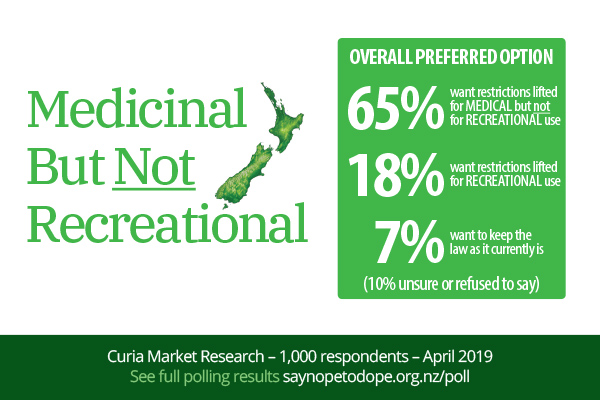
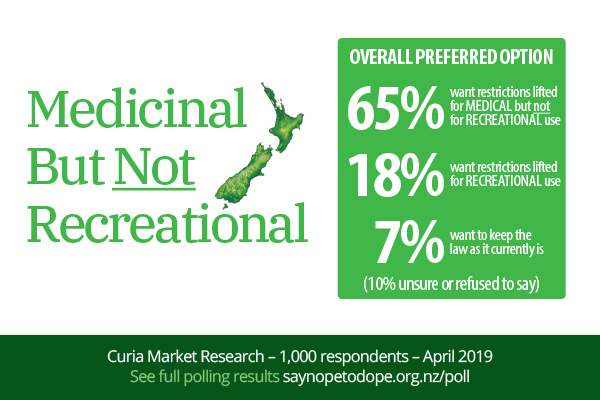 Media Release 23 April 2019
Media Release 23 April 2019
In a shock poll result, less than 20% (one in five) New Zealanders support legalisation of marijuana, but there is strong support for lifting restrictions for medical use (65%), according to an independent poll of 1,000 people by Curia Market Research. 7% support the law as it stands. There is also significant concerns about the mental health and societal costs of cannabis.
“This poll removes the smokescreen and confusion that drug advocates have created with the mixing of terms ‘medicinal’, ‘decriminalise’ and ‘legalise’. It is clear that Kiwis strongly support a compassionate response to those in real need with a cautious and researched approach around cannabis medicine, but when they thoughtfully consider the real implications of legalising recreational use, they completely reject the proposal – and rightly so,” says a spokesperson for the SayNopeToDope campaign.
Weakest support for legalising marijuana came from National voters (7%), NZ First voters (19%) and Labour voters (28%). Significantly, only 53% of Green voters supported legalisation.
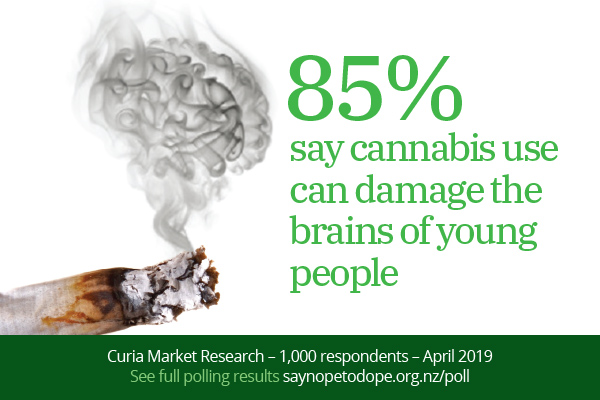 The independent polling, commissioned by the SayNopeToDope Campaign also found:
The independent polling, commissioned by the SayNopeToDope Campaign also found:
- 85% think that cannabis use can damage the brains of young people under the age of 25.
- 81% think that drivers using cannabis are more likely to cause accidents.
- 63% think that cannabis users aged under 25 are less likely to get a job (only 20% think it makes no difference)
- 49% think that cannabis usage will increase if restrictions are reduced, 35% think usage would remain the same and 6% decrease.
- 22% think that tobacco companies are pushing for restrictions on cannabis to be lifted, 42% are unsure, and 36% disagree.
“Evidence shows that marijuana – which has skyrocketed in average potency over the past decades – is addictive and harmful to the human brain, especially when used by adolescents. In US states that have already legalised the drug, there has been an increase in drugged driving crashes, youth marijuana use, and costs that far outweigh tax revenues from marijuana. These states have seen a black market that continues to thrive, sustained marijuana arrest rates, and tobacco company investment in marijuana. Portugal has seen a rise in the prevalence of every illicit psychoactive substance (affected by the weight of cannabis use in those aged 15-74) in the last five years.”
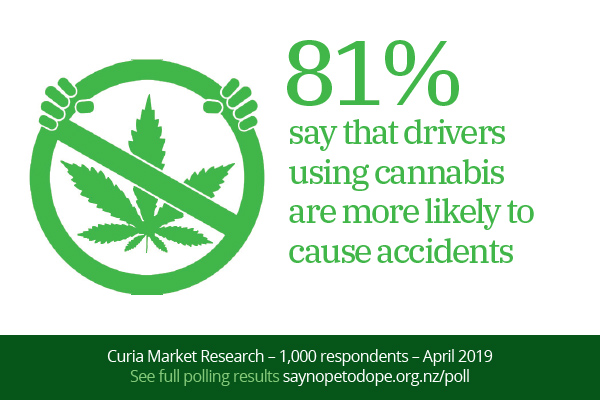 “A sensible drug policy should recognise three pillars – similar to the successful approach towards SmokeFree NZ:
“A sensible drug policy should recognise three pillars – similar to the successful approach towards SmokeFree NZ:
- supply reduction – target the dealers and suppliers
- demand reduction – promote a drug-free culture
- harm reduction – ensure addiction services & support are available for those who genuinely want to quit. The primary purpose is not to keep users using, but reduce and help them exit drug use.
A smart arrest policy can both provide a societal stamp of disapproval and provide an opportunity to intervene and stop the progression of use. Keeping marijuana illegal through an appropriate application of the laws that cater for ‘youthful indiscretions’ and which focus on supply and dealers is as much a public safety policy as it is a public health policy,” says a spokesperson for the SayNopeToDope campaign.
“But at a time when New Zealand’s mental health system is bursting at the seams, we should go no further and legitimise a mind-altering product which will simply add to social harm?”
The SayNopeToDope Campaign supports the rapid expansion of further quality research into the components of the marijuana plant for delivery via non-smoked forms, and the establishment of a programme that allows seriously ill and terminal patients (including children) to obtain other non-smoked components of marijuana approved and listed by the Ministry of Health via their doctor – with appropriate funding and pricing for patients. Neurologists, palliative care and pain specialists should have a key role in this process.
“Ultimately, the medical profession should be dictating the direction of this debate, not politicians, an anecdotal-wielding lobby, and marijuana advocates with a hidden agenda.”
The nationwide poll was carried out at the beginning of this month and has a margin of error of +/- 3.1%. READ THE FULL RESULTS

